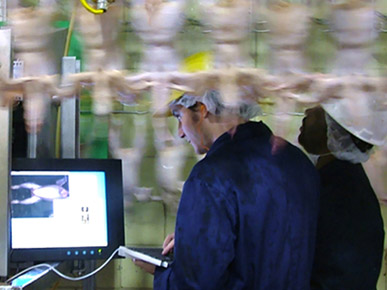Achieving Efficiency: New Energy Options, New Breakthroughs in Food Processing Technology
Georgia's food processing industry is innovating with new green technologies and cutting-edge methods developed by companies and state universities.
September 2010

To be successful, businesses must continually look for ways to cut costs, yet continue to improve their products and services. It's a balancing act, and it's all about efficiencies.
Reducing Energy Use, Costs, and Carbon Footprint
There are many ways in which food-processing companies can achieve greater energy efficiencies and reduce their carbon footprint. An energy audit is an excellent method for establishing energy consumption and identifying opportunities to lower energy usage and costs. If your local electric utility offers energy audits, their experts can advise you on specific ways you can improve efficiencies at your facilities.
Low-cost options that can usually be implemented immediately include fixing leaks in steam, hot water, and compressed air systems and replacing faulty components such as steam traps. Also consider using higher efficiency (T8) fluorescent lighting with electronic ballasts. There are tax deductions for lighting retrofits completed by December 31, 2013.
Make sure your electric rate is appropriate for your facility, as well. Many electric companies offer time-of-use and RTP (Real-Time Pricing) rates that provide incentives to reduce usage from 2 p.m. until 7 p.m. in the summer months. If your plant has the ability to shift maintenance to these hours or to shift electrical loads during the off-peak times, you will be able to reduce your overall energy costs. Your local utility may help perform a cost analysis for competitive loads and rate comparison analysis to make sure your plant is on the most cost-effective rate.
Switching to electric equipment can save money and further reduce your company's carbon footprint. For example, when it's time to replace your gas boilers, consider electrode boilers - which are 99 percent efficient - for fuel-switching options. In Gainesville, Georgia, Mar-Jac Poultry has successfully added an electrode boiler, as well as taken advantage of RTP electric rates, to increase the plant's efficiency and to hedge against higher energy costs. The Mars confectionary plant in Bainbridge, Georgia, is another great example of a facility that has seen significant energy savings by installing an electrode boiler.
Many Georgia companies are in the forefront of environmental sustainability. Initiatives include constructing LEED-certified buildings, and recycling heat, energy, and waste. Several companies have implemented a zero-landfill initiative and others have had success using variable-frequency drive motors (VFDs) to lower their motor demand. New warehouse technologies have also been used to increase efficiency, helping companies stay competitive.
Heat-recovery analysis can show the cost savings for extracting waste in a plant and redirecting it for water heating, which reduces carbon emissions and saves energy on natural gas or fuel oil if a facility is using these types of fuels for heating its water.
With the right electric technologies, efficiency often means saving energy and money, and finding a better, higher-quality production process. It's more important than ever to use energy-efficient products and processes whenever possible, but there are other ways to be environmentally friendly and more cost-effective, as well.
Engaging in R&D
Great efficiencies can also be gained as a result of research and development. One organization on the cutting edge of food processing research is the Georgia Tech Research Institute's (GTRI) Food Processing Technology Division (FPTD). GTRI is the applied research and development arm of Georgia Tech, and FPTD develops next-generation technologies for processing efficiency and operational enhancement in the food processing industry. FPTD's research areas include advanced robotics and automation, imaging and sensing for product quality and safety, and environmental, energy, and worker safety technologies. The following are examples of promising research projects taking place in Georgia:
• Biofuels Research and Novel Separation Techniques: Researchers are developing new processes to enhance the conversion of low-quality waste oils and grease to higher-grade neutral oils or fuels. The processes adapt the current refining processes used for oils and fats to improve the separation of feedstock fractions from brown grease and stabilized poultry fat.
• Advanced UV Disinfection System: The FPTD team has developed a prototype high-efficiency germicidal ultraviolet light system to disinfect opaque liquids and improve the pathogen efficacy of similar recycled streams.